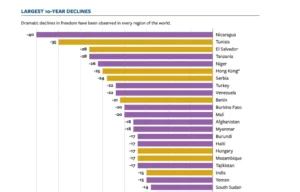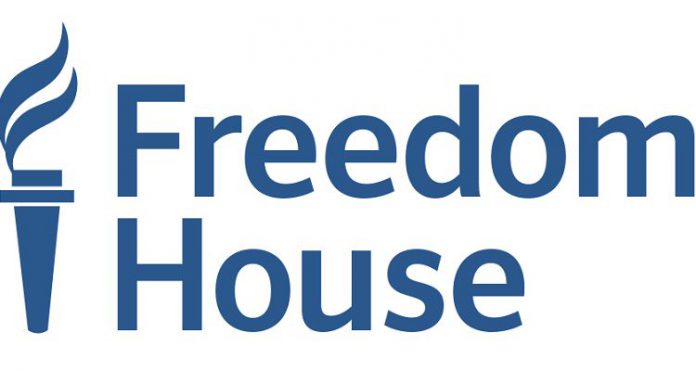Turkey is among the top 10 countries that have seen the sharpest decline in freedoms over the past decade, the Stockholm Center for Freedom reported, citing the “Freedom in the World 2025” report published by Freedom House on Wednesday.
The US-based watchdog found that Turkey’s score has dropped by 22 points since 2014, placing it alongside Venezuela in the seventh spot on the list of countries that have experienced the worst democratic backsliding.
The report evaluates freedom based on two main pillars: political rights and civil liberties. Turkey has seen declines in both areas, particularly in judicial independence, press freedom, freedom of expression and political pluralism.

The report continues to classify Turkey as “Not Free,” a designation it has held since 2018. The findings put Turkey in the company of Nicaragua, Tunisia, El Salvador and Tanzania, all of which have experienced significant declines in freedoms.
The findings come amid a broader trend of democratic decline worldwide. The report notes that global freedom has deteriorated for the 19th consecutive year, with 60 countries experiencing a reduction in political rights and civil liberties in 2024 alone.
Turkey remains part of this downward trajectory, with restrictions on press freedom, judicial independence and political opposition continuing to raise concerns.
Turkey’s democratic decline accelerated after a coup attempt on July 15, 2016. President Recep Tayyip Erdoğan and his government blamed the coup on the faith-based Gülen movement, inspired by the late Muslim cleric Fethullah Gülen, and responded with a nationwide purge of perceived dissidents. Gülen and the movement strongly deny involvement in the failed coup or any terrorist activity.
Erdoğan has been targeting followers of the Gülen movement since corruption investigations revealed in 2013 implicated then-prime minister Erdoğan as well as members of his family and inner circle.
Dismissing the investigations as a Gülenist coup and conspiracy against his government, Erdoğan designated the movement as a terrorist organization and began pursuing its followers. He intensified the crackdown on the movement following the abortive putsch in 2016.
Since the coup attempt, more than 705,172 people have been investigated on terrorism related charges due to their alleged links to the movement. There are at least 13,251 people in prison who are being held in pretrial detention or convicted of terrorism charges in Gülen-linked trials.
Following the failed coup, the Turkish government declared a state of emergency and carried out a massive purge of state institutions under the pretext of an anti-coup fight. Over 130,000 public servants, including 4,156 judges and prosecutors, and more than 24,000 members of the armed forces were summarily removed from their jobs for alleged membership in or relationships with “terrorist organizations” by emergency decree-laws subject to neither judicial nor parliamentary scrutiny.
Since then, Turkey has maintained a state of heightened repression. The political opposition, media and civil society have faced mounting pressure, making it increasingly difficult to challenge the ruling government.
The erosion of political rights in Turkey has been accompanied by a series of high-profile cases that exemplify the government’s tightening grip on opposition voices. Selahattin Demirtaş, the former co-chair of the pro-Kurdish Peoples’ Democratic Party (HDP), has been imprisoned since 2016 on terrorism-related charges that human rights organizations call politically motivated. Despite repeated rulings from the European Court of Human Rights demanding his release, Turkish courts have refused to comply.
Osman Kavala, a prominent philanthropist and civil society leader, has been serving a life sentence without parole over his alleged role in the 2013 Gezi Park protests and the 2016 coup attempt, despite a lack of credible evidence. His prolonged detention has drawn international criticism, with the European Union and the Council of Europe urging Turkey to abide by international human rights standards.
Ekrem İmamoğlu, the opposition mayor of Istanbul, was sentenced to more than two years in prison in 2022 for allegedly insulting election officials. The ruling, widely condemned as an attempt to sideline a potential challenger to Erdoğan, has added to concerns about the government’s use of the judiciary to suppress political rivals.
Press freedom has also suffered, with Turkey ranking among the worst jailers of journalists in the world. Independent media outlets have been shut down or forced into government control, and journalists critical of the government have faced arrest, surveillance and intimidation. Broad anti-terror laws have been used to silence dissent, making it increasingly risky for reporters to cover politically sensitive topics.
The Freedom House report points to election manipulation as a growing global concern, particularly in hybrid and authoritarian regimes. While Turkey still holds multi-party elections, opposition parties and international observers have long raised concerns over electoral fairness, state media bias and restrictions on political campaigning.
During past elections, the government has been accused of using state resources to boost Erdoğan’s ruling party, manipulating the judiciary to disqualify opposition candidates and controlling media narratives to limit public discourse. The 2024 local elections were closely watched for potential irregularities, with critics warning that the electoral process remains skewed in favor of the ruling Justice and Development Party (AKP).
Freedom House’s “Freedom in the World” report is one of the most comprehensive annual assessments of global democracy, covering 195 countries and 13 territories. The 2025 edition evaluates developments between January 1 and December 31, 2024.



